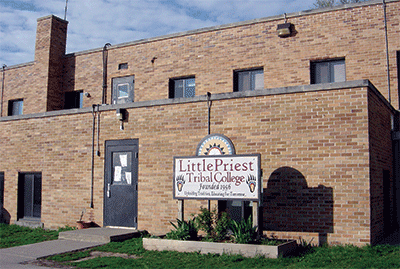
- Details
- By Native News Online Staff
Little Priest Tribal College (LPTC), located in Winnebago, Nebraska, received a National Science Foundation (NSF) Equity for Excellence (EES) for science, technology, engineering, and math (STEM).
The grant will help the college to improve cybersecurity and create STEM opportunities for its students. It will further help LPTC to meet compliance standards.
LPTC PresidentManoj Patil says that this is a major win for the college and the funding is a much-needed step toward resourcing tribal colleges and universities (TCUs).
“Little Priest Tribal College offers the same quality education that you’ll find at major universities, but TCUs do not have access to many of the same higher funding resources,” says Patil. “We are grateful to NSF for recognizing the need to invest in TCUs because these are the types of opportunities that can help us continue to support our own STEM experts within Indian Country.”
The NSF funding is also helping LPTC achieve benchmarks in ways that increase the safety and wellbeing of its students, families, and stakeholders.
“We live in a world where we rely heavily on secure, reliable technology but creating these systems comes at a high cost,” says Morri Conway, LPTC Director of Information Technology.
“Practically speaking, the grant funding will help the college get closer to its strategic goals of staffing, protecting the institutional network and data, providing a safe learning environment for students, and meeting federal and state compliance measures.”
Little Priest Tribal College will move forward with its planned cybersecurity infrastructure project and expects to be complete by May 31, 2024. To learn more about the Little Priest Tribal College, please visit, https://www.littlepriest.edu/about-lptc/.
More Stories Like This
Bard College Center for Indigenous Studies (CfIS) Hosts Annual Symposium With Keynote Speaker Miranda Belarde-Lewis on March 9–10American Indian College Fund Announces Spring 2026 Faculty Fellow Cohort
Navajo Nation Signs $19 Million Diné Higher Education Grant Fund Act into Law
Dr. Shelly C. Lowe to Be Inaugurated as IAIA President March 26–27
Tlingit Language Courses Expand for Students to Learn With Families At-Home
Help us defend tribal sovereignty.
At Native News Online, our mission is rooted in telling the stories that strengthen sovereignty and uplift Indigenous voices — not just at year’s end, but every single day.
Because of your generosity last year, we were able to keep our reporters on the ground in tribal communities, at national gatherings and in the halls of Congress — covering the issues that matter most to Indian Country: sovereignty, culture, education, health and economic opportunity.
That support sustained us through a tough year in 2025. Now, as we look to the year ahead, we need your help right now to ensure warrior journalism remains strong — reporting that defends tribal sovereignty, amplifies Native truth, and holds power accountable.
 The stakes couldn't be higher. Your support keeps Native voices heard, Native stories told and Native sovereignty defended.
The stakes couldn't be higher. Your support keeps Native voices heard, Native stories told and Native sovereignty defended.
Stand with Warrior Journalism today.
Levi Rickert (Potawatomi), Editor & Publisher

